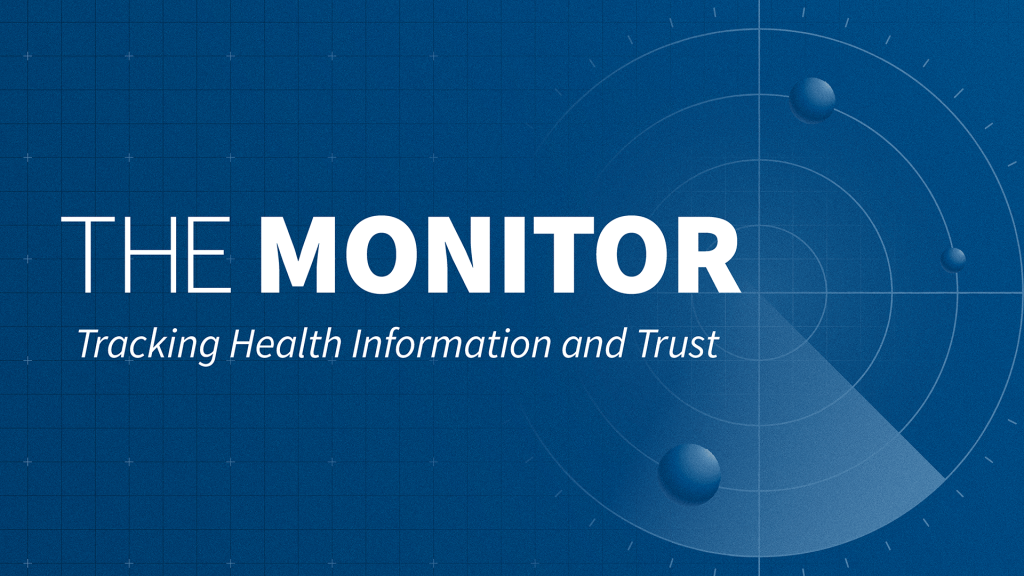VOLUME 32
Debunked Autism Claims Resurface After Press Conference, And Supreme Court to Hear Cases on Conversion Therapy and School Vaccine Mandates
Summary
This volume analyzes the resurgence of false narratives about autism rates in Cuba and among Amish people in the U.S. following recent statements by President Trump. It also examines health-related cases before the Supreme Court this term, including challenges to state bans of conversion therapy for LGBTQ+ people and on school vaccine mandates. Lastly, it highlights research showing the limitations of AI chatbots as primary sources of health information.
Recent Developments
False Claims About Autism Rates in Cuba and in Amish Communities Resurface After Press Conference on Tylenol

What’s Happening?
At a September 22 press conference announcing HHS actions related to acetaminophen, the main ingredient in Tylenol, President Donald Trump revived misleading claims about the prevalence of autism in certain populations, including in Cuba and in Amish communities in the U.S. President Trump cited the two groups as examples of people who “don’t take vaccines and don’t take any pills” and “have essentially no autism,” implying an association between vaccines and medications and autism.
Why It Matters
- Political amplification of these long-debunked claims may bring them to new audiences, particularly if health communicators have stopped actively countering these claims.
- Renewed circulation of the claim that vaccines cause autism may influence parents’ vaccination decisions and contribute to vaccine hesitancy, despite extensive research showing no causal relationship.
- Attempts to link common medications or vaccines to autism may contribute to stigma and reinforce the idea that autism, which has a largely genetic basis, is a preventable condition.
What Are People Saying?
KFF’s monitoring of the social media platform X found that, as of September 29, mentions of autism among Cuban and Amish populations identified in our search rose nearly 1400% over the last 30 days when compared to the previous 30-day period, increasing from almost 12,000 to approximately 160,000 posts, reposts, and comments. Many of the most-engaged-with posts sought to refute the claims, but some influential accounts, including a radio host and founder of InfoWars who has more than 4 million followers, amplified them to large audiences.
Where Do These Claims Come From?
These narratives have appeared cyclically for many years, often tied to broader messaging opposed to vaccination. The claims rely on and perpetuate assertions that vaccines are associated with autism, but decades of research has shown there is no association between autism and vaccines.
What Does The Evidence Say?
- Many Amish children do receive vaccines, with a 2017 study of an Amish community in Ohio showing that 98% of parents surveyed had accepted at least some vaccines for their children. A 2011 survey found similar patterns, with 85% of Amish parents reporting that all or some of their children had received at least one immunization.
- While some research has suggested rates of autism among Amish children are lower than the prevalence in the general population, the topic has not been extensively studied. The lower rate may be a result of underdiagnosis, with cultural differences including different utilization of healthcare and different educational environments potentially leading to underreporting. Similarly, lower reported rates of autism in Cuba may result from lack of diagnostic resources. The World Health Organization (WHO) has said that the prevalence of autism in many low- and middle-income countries is unknown.
Polling Insights: A recent KFF/Washington Post Survey of Parents found that though few parents say it is true that MMR vaccines can cause autism in children (9%), many express uncertainty, with about half (48%) saying they do not know enough to say.
Belief in the false claim that MMR vaccines can cause autism is correlated with the medical decisions parents are making for their children. Notably, parents who say they skipped or delayed recommended vaccines for their children are more than four times as likely as those who have kept their children up to date to say it is true that MMR vaccines can cause autism in children (27% v. 6%).
Supreme Court Case Challenges State Bans on Conversion Therapy

What’s Happening?
The Supreme Court began hearing cases this week for its new term, with oral arguments taking place on Tuesday in Chiles v. Salazar, a case that addresses whether state bans on conversion therapy for minors violate Constitutional free speech protections. Conversion therapy refers to practices that attempt to change or suppress an LGBTQ person’s sexual orientation or gender to conform to heterosexual or cisgender identities.
Why This Matters
- The case focuses on free speech protections, but discussions around conversion therapy bans and the case inaccurately portray conversion therapy as an effective way to change an individual’s gender identity or sexual orientation through intervention, contradicting established medical consensus. Such claims discount the known risks of conversion therapy, including higher rates of depression, suicidality, and substance abuse. If the Court overturns Colorado’s ban of conversion therapy for minors, the decision could be used to legitimize these false claims in support of conversion therapy.
- In 2023, the KFF/Washington Post Survey of Trans Adults found that 11% of trans adults said as a child or teenager they attended conversion or reparative therapy that tried to change their sexual orientation or gender identity. A ruling upholding the ban would reaffirm states’ ability to regulate conversion therapy based on its documented harms. 23 states and DC have banned conversion therapy for minors, but a ruling overturning these bans could limit states’ ability to regulate these practices.
What Are People Saying?
- The Supreme Court case has brought attention to conversion therapy in online discussions. In 2025, “conversion therapy” was mentioned an average of about 1,015 times per day in posts, reposts, and comments across X, Reddit, and Bluesky. But on the day the Supreme Court announced that it would review the case, the number of mentions jumped to 8,586, followed by 9,571 the next day. This was the biggest spike of the year, showing how the case announcement pulled the topic into broader public conversation. Although smaller in size, additional spikes in conversation about conversion therapy occurred around key case developments, with mentions more than tripling compared to the daily average on August 6, around the time when oral arguments were scheduled. The increases in conversation closely track with court milestones, suggesting that coverage of the case directly fuels discussion and potentially creates moments for false claims to spread.
- While many of the most-engaged-with posts, especially earlier in the year, condemned conversion therapy, the visibility of the case has contributed to an increase in false claims about conversion therapy. Posts throughout September incorrectly claimed that bans “criminalize helping confused youth” or leave youth with gender dysphoria without resources.
- Overall, the volume of online conversation about conversion therapy is still limited compared to discourse around other LGBTQ issues. But as attention towards conversion therapy increases, false narratives that claim banning it removes support for youth with gender dysphoria or that ignore generally agreed upon harms have gained visibility. In one high-engagement post, for example, a parent of a child with gender dysphoria said that Colorado’s ban restricted what counselors could discuss during therapy sessions, misleadingly asserting that this led to worse mental health and harmed “vulnerable kids.” These types of posts frame the bans as limiting access to care rather than restricting harmful practices, which may resonate with audiences unfamiliar with the medical consensus that conversion therapy causes psychological harm. KFF is monitoring whether the start of oral arguments prompts new or resurfacing narratives, as similar patterns emerged when the Court previously heard cases involving gender-affirming care.
How Do the Legal Proceedings Create Opportunities to Legitimatize These Narratives?
- Some of the legal arguments presented in the case create opportunities for misleading narratives to gain credibility. The respondent’s brief addresses these misconceptions by noting that the petitioners claim, without substantial evidence, that “restrictions like Colorado’s” have left “detransitioners . . . with no counseling support whatsoever in much of the United States.” The brief also highlights that the petitioners rely on an unverified Reddit post to suggest that patients struggling with gender identity will have difficulty accessing mental health care.
- While the petitioners in the case do not primarily focus on gender-affirming care in their initial request for review by the court or in their brief, they do suggest that conversion practices might play a role as an alternative to gender-affirming care. Some amicus briefs filed in support of the petitioner echo this sentiment, with a few using inflammatory language around this care. Such narratives erroneously conflate gender-affirming care debates with the issue before the court in this case and suggest conversion therapy is a substitute for gender-affirming care, distracting from the evidence around the harms associated with conversion efforts.
What Does The Evidence Say?
- Conversion therapy is not supported by evidence and research shows attempts to change sexual orientation or gender identity are associated with adverse mental health outcomes. There is no credible evidence that such practices can change sexual orientation or gender identity, and 28 medical and mental health associations have signed onto a joint statement opposing conversion practices. Some, including the AAP and American Psychological Association (APA), have provided independent statements opposing the practice.
Challenge to School Vaccine Mandates Focuses on Use of Fetal Cell Lines

What’s Happening?
- During its October term, the Supreme Court will weigh whether to grant an emergency injunction in We the Patriots USA, Inc. v. Ventura Unified School District, a case involving a California mother who argues that the state’s school vaccine mandate, requiring her son to get vaccinated to attend school, infringes on her religious freedom because some vaccines were developed or tested using fetal cell lines originally derived from abortions performed decades ago. The woman claims that vaccinating her son with products connected to abortion would violate her Christian faith, regardless of when the abortion occurred.
- The case has drawn attention as false claims circulate on social media that vaccines contain fetal tissue or “debris,” despite no such material being present in final vaccine products.
Why This Matters
- While the current case focuses on the historical use of these cell lines in vaccine development, a factual element of how some vaccines were developed, the increased attention on the topic may also increase exposure to pre-existing false claims that current vaccines contain fetal tissue or “debris” in their final products.
- Despite major religious authorities, including the Catholic Church, concluding that using vaccines developed with these cell lines is morally acceptable, the case provides an opportunity for the false claim that fetal tissue is present in current vaccines to spread and may influence vaccination decisions by parents who have a religious objection to abortion. Even though no fetal material is present in final vaccine products, this misconception may contribute to increased vaccine hesitancy and declining public confidence in vaccines, particularly among parents with religious objections or limited understanding of the difference between historical cell line use and the vaccines they receive.
How Is The Narrative Spreading?
- Influential figures, including health authorities like HHS Secretary Robert F. Kennedy Jr., have previously misrepresented the historical use of fetal cell lines in vaccine development, claiming that fetal tissue or fetal “debris” is present in final vaccine products.
- On average, 168 posts, reposts, or comments on X mentioned fetal cell lines or tissue in vaccine-related content identified in KFF’s search each day in September. This number rose to nearly 2,000 on September 21 following Fox News coverage of the emergency petition, illustrating how the narrative can expand when amplified through high-profile media attention.
- Even before the case gained prominence, false claims about fetal tissue being present in vaccines were circulating online. Days before the emergency petition was filed on September 11, one account with nearly 2 million followers listed “fetal tissue” among a list of vaccine ingredients, implying that parents would not choose to vaccinate their children if they knew vaccines contained such tissue. Many of the comments on the post signaled agreement, with several criticizing what they called pharmaceutical greed or corruption.
Where Did This Confusion Come From?
- Fetal cell lines are laboratory-grown cells used in vaccine research and production because they provide a controlled environment needed to create vaccines. These cell lines were originally established from elective abortions performed decades ago, but the cells used today are many generations removed from the original tissue, and no further abortions are performed or necessary for vaccine development.
- Some vaccines, including the rubella component of the MMR vaccine, the chickenpox vaccine, and the hepatitis A vaccine were developed using these lines.
What Does The Evidence Say?
No fetal tissue or “debris” is present in final vaccine products. The manufacturing process involves growing viruses in fetal cell lines, then purifying the vaccines to remove any cellular material, leaving only the viral components needed for immunity.
Polling Insights: KFF’s latest Tracking Poll on Health Information and Trust finds that seven in ten parents oppose their state removing public school vaccine requirements, while three in ten support removing these vaccine requirements. Support differs sharply across partisans, with about half (48%) of Republican and Republican-leaning independent parents saying they support removing public school vaccine requirements in their state compared to far fewer Democratic and Democratic-leaning parents (13%).
The survey also found that just over half (56%) of parents say getting children vaccinated is “part of parent’s responsibility to protect the health of others,” while just under half (44%) instead say it is a “parent’s personal choice.” Most Republican and Republican-leaning parents say that getting children vaccinated is a parent’s personal choice (62%), while most Democratic and Democratic-leaning parents say it’s a responsibility to protect others (74%).
AI & Emerging Technology
Study Finds AI Chatbots Provide Low-Quality Information on Fibromyalgia

What Did Researchers Find?
- A recent study published in Archives of Rheumatology evaluated how six major artificial intelligence (AI) chatbots, including ChatGPT, Gemini, and Copilot, responded to the 10 most commonly searched questions about fibromyalgia, a chronic condition that causes widespread pain. Researchers rated each of the responses on content quality, accuracy, readability, and alignment with evidence-based guidelines, like those from the American College of Rheumatology. The quality of the responses was rated using a standardized system designed to evaluate the quality of health information based on structure, accuracy, and how well responses aligned with evidence-based guidelines, with scores expressed as a percentage.
- Even the best-performing chatbot (Gemini) provided “low-quality” information, scoring 40.5 out of 100, while the worst (ChatGPT 3.5) was rated “very low-quality,” scoring 20.6. The study identified moderate levels of factual inaccuracies, unsupported claims, or omissions of important information across all of the chatbots. All of the chatbots produced responses at university reading levels, potentially making the information inaccessible to many patients.
Why This Matters In This Context
- Patients with fibromyalgia report high levels of stigma and skepticism from healthcare providers, and the condition has been historically dismissed by some as a psychosomatic disorder. As a result, these patients may be more likely to turn to online sources like AI chatbots for information.
- The study’s authors concluded that even when the chatbots provided generally accurate facts, the quality, understandability, and actionability of the responses were insufficient to help patients.
What Are The Broader Implications?
- The findings align with research on the usefulness of AI chatbots for other chronic conditions, including colorectal and renal cancers, which have shown inconsistent quality and low readability. As more people turn to AI chatbots for health information, the risks of false information and the gap between accessibility and readability may create risks for patient safety.
- The study’s authors emphasize the need for clinician involvement in developing and validating AI tools to ensure alignment with evidence-based standards, and recommend chatbots as supplementary tools rather than primary sources of health information.
Support for the Health Information and Trust initiative is provided by the Robert Wood Johnson Foundation (RWJF). The views expressed do not necessarily reflect the views of RWJF and KFF maintains full editorial control over all of its policy analysis, polling, and journalism activities. The data shared in the Monitor is sourced through media monitoring research conducted by KFF.





